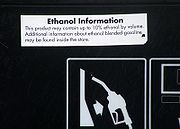Ethanol Fuel
From Wikipedia, the free encyclopedia
| Renewable energy |
|---|
| Biofuels Biomass Geothermal Hydro power Solar power Tidal power Wave power Wind power |
Ethanol fuel is ethanol (ethyl alcohol), the same type of alcohol found in alcoholic beverages. It can be used as a fuel, mainly as a biofuel alternative to gasoline, and is widely used in cars in Brazil. Because it is easy to manufacture and process and can be made from very common crops such as sugar cane and corn, it is an increasingly common alternative to gasoline in some parts of the world.
Anhydrous ethanol (ethanol with less than 1% water) can be blended with gasoline in varying quantities up to pure ethanol (E100), and most spark-ignited gasoline style engines will operate well with mixtures of 10% ethanol (E10).[1] Most cars on the road today in the U.S. can run on blends of up to 10% ethanol,[2] and the use of 10% ethanol gasoline is mandated in some cities where harmful levels of auto emissions are possible.[3]
Ethanol can be mass-produced by fermentation of sugar or by hydration of ethylene (ethene CH2=CH2) from petroleum and other sources. Current interest in ethanol mainly lies in bio-ethanol, produced from the starch or sugar in a wide variety of crops, but there has been considerable debate about how useful bio-ethanol will be in replacing fossil fuels in vehicles. Concerns relate to the large amount of arable land required for crops,[4] as well as the energy and pollution balance of the whole cycle of ethanol production.[5][6] Recent developments with cellulosic ethanol production and commercialization may allay some of these concerns.[7]
According to the International Energy Agency, cellulosic ethanol could allow ethanol fuels to play a much bigger role in the future than previously thought.[8] Cellulosic ethanol offers promise as resistant cellulose fibers, a major component in plant cells walls, can be used to generate ethanol. Dedicated energy crops such as switchgrass are also promising cellulose sources that can be produced in many regions of the United States.[9]
Contents[hide] |




No comments:
Post a Comment